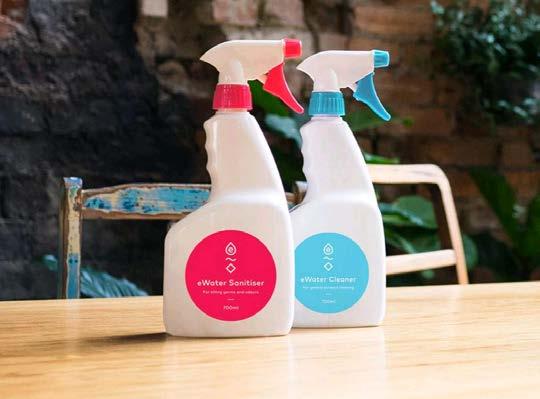
4 minute read
Innovation How eWater Systems is making a splash
How eWater Systems is making a splash
By James Dunn
Advertisement
Victoria’s first COVID lockdown, in March, was bad enough for the hospitality industry; but the second was infinitely worse. After 10 weeks of restrictions, Victorians were finally allowed to wine and dine – only 20 at a time – at hundreds of venues from 1 st June. Five weeks later, stage three restrictions were reimposed for six weeks in metropolitan Melbourne and the Mitchell Shire in a bid to slow a rapid spread of coronavirus; and cafes, restaurants and pubs within the restricted zones were forced to return to takeaway only. Then, on 2 nd August, stage four restrictions came into effect, slowing that trade to a trickle. It hit the industry hard, as venues, suppliers and caterers were ramping up activity to get business back up and running when the second lockdown slammed down. For Phil Gregory and his team at Melbournebased biotech company eWater Systems, the pain of their restaurant and bar customers flowed straight through.
eWater systems provides sanitised water for restaurants.
eWater Systems supplies electrolysis units that take a solution of tap water and high-grade salt (sodium chloride) and pass it through an electrolyser, producing two oppositely charged solutions with altered physical and chemical properties. One, produced from the positively charged anolyte solution, is highly microbicidal and is used as a sanitiser. The other, produced from the negatively charged catholyte solution, consists mainly of sodium hydroxide, making it a form of pure liquid soap. This gives it detergent and degreasing properties, making it a versatile general purpose cleaning agent. “They are ‘organic’ products that have mostly been used in the high-end hospitality industry, for applications around food,” said Gregory. “They are used to kill bacteria and get rid of pesticides, which are toxic, to clean and sanitise cutlery and cutting boards, for kitchen and waitstaff to wash their hands, and to refill spray bottles for washing down surfaces.” Gregory said it’s the influence of the MasterChef generation. “Really from the time we started the business, in 2007, the high-end hospitality industry has been our biggest market. It’s that whole ‘paddock-to-plate’ philosophy, where it’s important to know the provenance of everything on the plate, so that everything that’s gone into the dish is the best produce it can be,” Gregory said. “Those top chefs and restaurateurs spend so much time and take so much care getting the best ingredients they can find, they find it completely natural to use eWater, because the alternative is to use a synthetic chemical in the same kitchen, for cleaning and sanitising. Why would they do that, if they spend so much time and effort getting the best ingredients?” But COVID cut deeply into that industry overnight – so eWater Systems had to think fast. “We had to respond quickly, our cashflow was down dramatically, but we were fortunate in that we didn’t, like a lot of other businesses, have to start making something we hadn’t made before,” Gregory said. “What played into our hands, really, was that all of a sudden, stuff that was really uncool – hygiene
and cleaning – became a conversation stopper. People in offices suddenly wanted to clean the doorknobs, computer keyboards, mice, the lift buttons and so on. Our product was perfect for that: all we had to do was get into that market, of indoor environments generally, not just in food.”
eWater systems hand sanitiser is available to retail customers.

Initially, eWater Systems approached businesses such as David Jones and GPT, and quickly realised that their product was even better suited to commercial buildings than it thought. “There is a whole movement towards a ‘wellness’ environment in buildings, that is driving tenants and owners to think about our system. They know that tenants and their employees want better and safer work environments, and more sustainable business practices,” Gregory said. “The National Australian Built Environment Rating System (NABERS) has a star-rating system for the internal environment, and owners and tenants know that there’s not much point having a 6-star build quality if what’s inside the building is crappy. We are a product of choice for people who want a safe, clean, non-toxic internal environment. It will be a growing market for us, even when hospitality comes back.” eWater Systems also had to pivot on its pricing. “We were selling at full price but we realised that was making it difficult for a lot of people who were cashflow-challenged,” he said. “We made a batch of units and started renting them, so it was a daily cost, an operating expense rather than a capital cost. That’s been a good move, it has attracted people who otherwise wouldn’t have been involved. People don’t necessarily want to make a big capital commitment in an uncertain environment – it makes it simpler.” Gregory said the pivot has been “very successful” – with revenue back to about the same, with a very strong forward trajectory. “What we have lost in hospitality we have made up in other areas.” Small and medium business spokesperson at Westpac, Lisa Livis, said it’s the kind of story she’s hearing a lot. “Almost half of our SME (small and medium enterprise) customers have had to change the way they operate, and what they offer, to keep the business going. And 35 per cent of our business owners have told us that some of the changes that they have implemented will now become permanent.” * * * This article was first published in The Australian on 18 th August 2020










